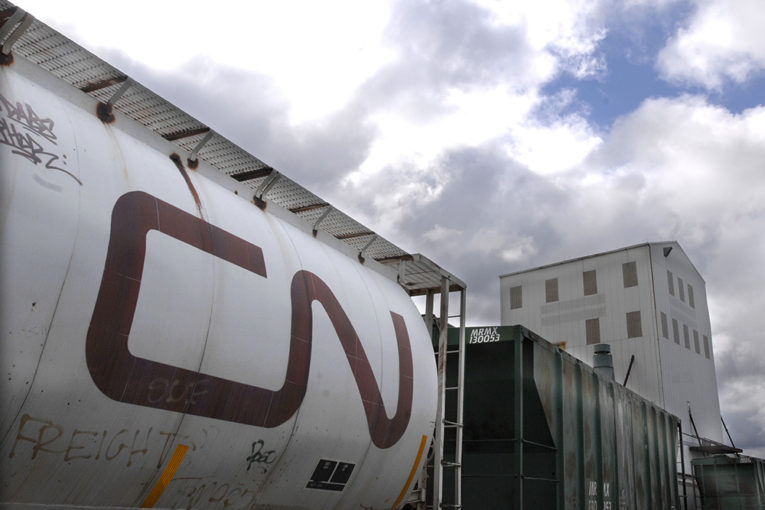
Two transportation issues are squeezing Alberta’s economy today: a grain backlog facing farmers and a lack of pipeline capacity crimping petroleum producers.
The problems on both fronts threaten to get worse if Canada can’t get more oil pipelines built in the coming years.
“We do need to be able to move grain and we have a problem right now in terms of our agricultural sector being priced out of access to rail,” Premier Rachel Notley said last week.
“As more and more oil gets on to rail, it pushes other products off of rail.”
The two issues are separate, but they do intersect.
Western Canadian farmers have been facing significant backlogs this winter to get their grain shipped by rail.
The situation is frustrating producers who are trying to prepare for the new crop year, yet grappling with transportation snafus that rival the problems witnessed in the winter of 2013-14.
According to the Ag Transport Coalition, Canadian National Railway supplied just 17 per cent of all hopper cars ordered a little more than a month ago, while Canadian Pacific Railway stood at 50 per cent.
The numbers have recovered as the weather has warmed up, sitting at 61 per cent for CP and 74 per cent for CN by mid-March.
The railways have blamed a large crop and extreme winter weather for the issue. They also note the industry is facing significant demand from the energy and potash sectors.
Related
Rail carriers have vowed to smooth out the process going forward. CN, for example, has been adding new crews and locomotives.
Alberta Agriculture Minister Oneil Carlier said the situation appears to be improving, but it remains a concern for farmers still waiting to move grain.
The underlying issues — lack of capacity and more commodities, such as oil, being transported by rail — must be addressed.
“This is a real issue for producers. They were expecting their paycheque and if they can’t get product to market, they don’t get paid,” he said in an interview.
“The sooner we can get a pipeline to tidewater, the sooner we can get some of those other commodities — oil and gas — out of the rail cars.”
Grain elevator companies say the lack of surge capacity in the rail system is crimping their sector as well, forcing them to face contract extension penalties and vessel demurrage fees.
“There has been a fair bit of damage done this year and we know we’re never going to recover that,” said Wade Sobkowich, executive director of the Western Grain Elevators Association.
In Alberta, the problems have been most acute for farmers in the Peace River area. Lynn Jacobson, president of the Alberta Federation of Agriculture, blames a lack of locomotive power and inadequate staffing for much of the delay.
Jeff Nielsen, a grain farmer in the Olds area, said it’s frustrating to see the issue reoccur after similar bottlenecks four years ago, when Ottawa had to intercede to get grain moving.
Bill C-49, which will modernize the federal transportation act, has now worked its way through the Senate — it includes reciprocal penalties on railways and suppliers — and should help avoid backlogs in the future, said Nielsen, who is president of the Grain Growers of Canada.
But Nielsen, like Alberta’s premier, is concerned about the fallout of more oil moving by rail instead of pipelines over the coming years.
“If someone else is needing more rail movement for their product, then that puts stress on the rest of the sector,” he said.
And that brings us to the pipeline fight.
Existing oil lines are already full and production in Alberta is expected to grow by more than 360,000 barrels per day this year.
Without sufficient pipeline capacity, more crude will move by rail, at a higher cost for petroleum producers and reduced royalties for the provincial government.
Oil shipments by rail averaged 152,000 barrels per day in December, up from 92,000 barrels last July.
Analyst Kevin Birn of energy consultancy IHS Markit expects rail movements could average 300,000 barrels per day this year, depending upon the timing and ability of railways to respond, as well as the performance of pipelines and heavy oil facilities.
As Alberta pushes for more energy infrastructure to be built, the oilpatch hopes other parts of the country — and other sectors — pay attention.
Crescent Point Energy CEO Scott Saxberg said pipeline opponents, such as the B.C. government, are fighting to block the Trans Mountain project, yet overlooking the effect of future transportation constraints on other segments of the economy, including agriculture.
“Obviously, if all that crude was on pipelines, which is way more environmentally friendly, efficient and cost-effective, we wouldn’t have that issue,” Saxberg said.
“Farmers are directly affected by B.C. and some of the decisions they’re making holding up that process.”
The grain backlog is another reason it’s important for Alberta to see new pipelines built.
If transportation bottlenecks aren’t unclogged, it has the potential to plug up two of Alberta’s key industries moving forward: agriculture and energy.
“(Grain) producers have struggled to ship their products where they have been forced to compete with oil and gas,” Notley concluded.
“That problem is only going to grow if we don’t get and keep our oil and gas products in pipelines.”
Chris Varcoe is a Calgary Herald columnist.
You can read more of the news on source
